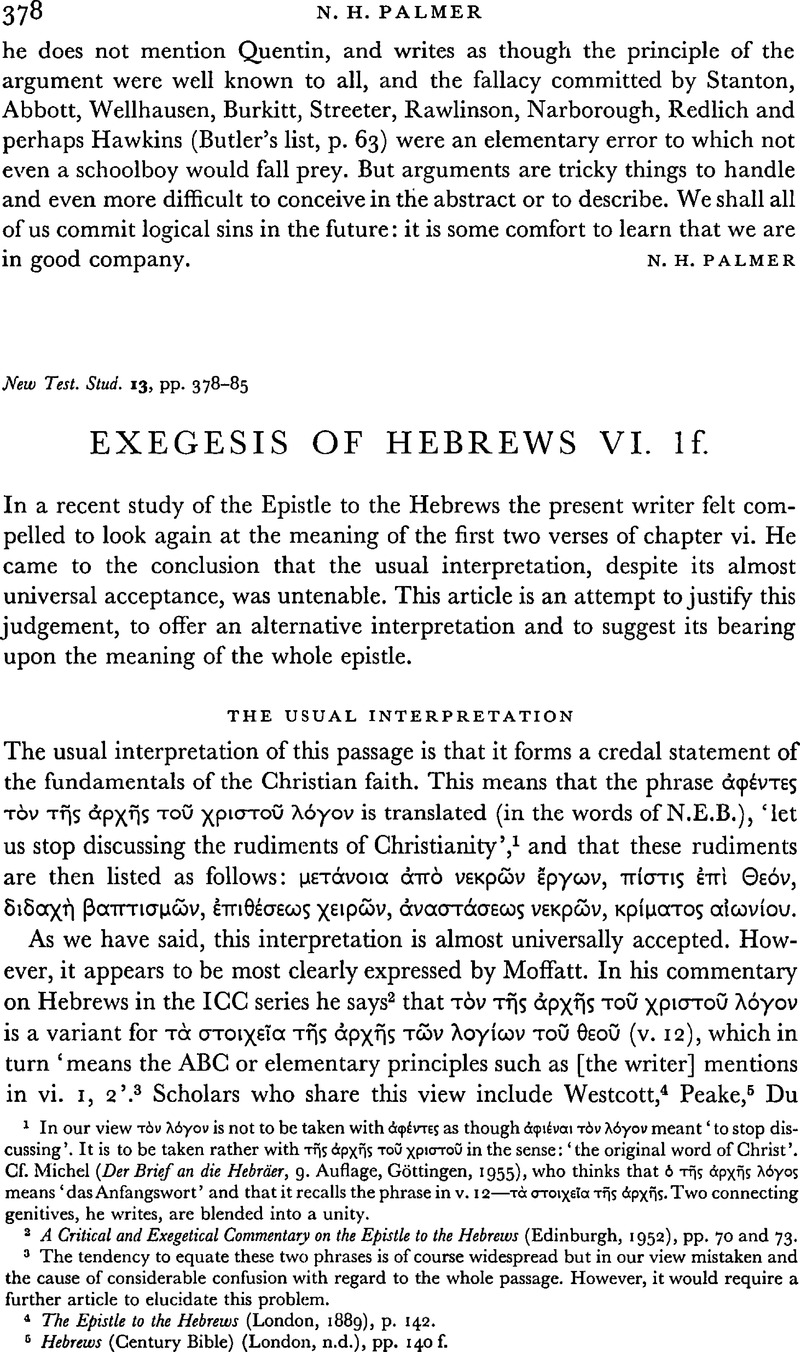No CrossRef data available.
Published online by Cambridge University Press: 05 February 2009

page 378 note 1 In our view τòν λóγον is not to be taken with άφέντες as though άφıέναı τòν λóγον meant ‘to stop discussing’. It is to be taken rather with τῆς άρχῆς τοῦ χρıοτοῦ in the sense: ‘the original word of Christ’. Cf. Michel, (Der Brief an die Hebra'er, 9. Auflage, Göttingen, 1955)Google Scholar, who thinks that ó τῆς άρχῆς λóγος means ‘dasAnfangswort’ and that it recalls the phrase in v. 12-τά στοıχεīα τῆς άρχῆς. Two connecting genitives, he writes, are blended into a unity.
page 378 note 2 Critical and Exegetical Commentary on the Epistle to the Hebrews (Edinburgh, 1952), pp. 70 and 73.Google Scholar
page 378 note 3 The tendency to equate these two phrases is of course widespread but in our view mistaken and the cause of considerable confusion with regard to the whole passage. However, it would require a further article to elucidate this problem.
page 378 note 4 The Epistle to the Hebrews (London, 1889), p. 142.Google Scholar
page 378 note 5 Hebrews (Century Bible) (London, n.d.), pp. 140 f.Google Scholar
page 379 note 1 High Priesthood and Sacrifice (London, 1908), p. 107.Google Scholar
page 379 note 2 L' Épitre aux Hébreux (Paris, 1952), vol. 2, p. 147.Google Scholar
page 379 note 3 The Epistle to the Hebrews (Moffatt Commentary) (London, 1953), p. 75.Google Scholar
page 379 note 4 L'Épitre aux Hebreux (Neuchatel and Paris, 1954), p. 58.Google Scholar
page 379 note 5 Op.cit. p. 145.Google Scholar
page 379 note 6 The Epistle to the Hebrews (London, 1955), p. 66.Google Scholar
page 379 note 7 The Epistle to the Hebrews (London, 1957), pp. 60 ff.Google Scholar
page 379 note 8 Theology of the New Testament (London, 1958/9), translated from the German byGoogle ScholarGrobel, K., vol. p. 68.Google Scholar
page 379 note 9 Das Wandernde Gottesvolk (4. Auflage, Göttingen, 1961), p. 117.Google Scholar
page 379 note 10 So, for example, Spicq, T. H. Robinson, Hering, Michel and Neil (ibid.).
page 379 note 11 The Epistle of Priesthood (Edinburgh, 1915), p. 15.Google Scholar
page 379 note 12 Op.cit. P. 145 n. 3.Google Scholar
page 379 note 13 Op.cit. p. 66.Google Scholar
page 379 note 14 Acts xvi.30 f., R.V.
page 379 note 15 The Earliest Christian Confessions (London, 1949), translated by Reid, J.K.S., pp. 38 f.Google Scholar
page 380 note 1 The Christology of the New Testament (London, 1959), translated by Guthrie, Shirley C. Jr, and Hall, C. A. M., p. 216.Google Scholar
page 380 note 2 ibid. p. 217.
page 380 note 3 ii.3; vii.14; xii. 14; xiii.20.
page 380 note 4 The Christology of the New Testament, p. 234.Google Scholar
page 381 note 1 So, for example, Westcott, op. cit. Peake, p., op. cit. p. 141Google Scholar; Nairne, , op. cit. p. 334Google Scholar; Moffatt, , op. cit. pp. 12 f.Google Scholar; Robinson, T. H., op. cit. pp. 68 f.Google Scholar and Manson, W., op. cit. pp. 61 f.Google Scholar
page 381 note 2 Op. cit. p. 144.Google Scholar Cf. also Spicq, , op. cit. vol. 2, p. 145Google Scholar; Héring, , op. cit. p. 57Google Scholar; Moffatt, , op. cit. p. 72.Google Scholar
page 381 note 3 ibid. p. 73.
page 382 note 1 St Paul's Epistles to the Colossians and to Philemon (2nd edn., London, 1876), p. 224.Google Scholar
page 382 note 2 Compare the author's use of άρχήν λαμβάνεıν here with ή άρχή in vi.i.
page 382 note 3 OP.cit. p. 39.Google Scholar
page 382 note 4 Op.cit. p. 94.Google Scholar
page 382 note 5 Jesus and the Word (London, 1958, Fontana Books), p. 049.Google Scholar
page 383 note 1 Op.cit. pp. 147 f.Google Scholar
page 383 note 2 Op.cit. p. 142.Google Scholar
page 383 note 3 Op.Cit. p. 75.Google Scholar
page 383 note 4 Op.cit. vol 2, p. 148.Google Scholar
page 383 note 5 Op.Cit. p. 57.Google Scholar
page 383 note 6 Op.Cit. pp. 145 ff.Google Scholar
page 383 note 7 Op.cit. p. 69.Google Scholar
page 383 note 8 Op.Cit. vol. 2, p. 148.Google Scholar
page 384 note 1 Perhaps it ought to be said that the first two things mentioned here, namely, repentance from dead works and faith in God, are also in accord with our theory. They had, or were thought to have had, a central place in the teaching of Jesus, see Mark i. 15.